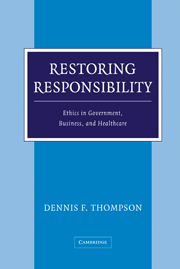Book contents
- Frontmatter
- Contents
- Acknowledgments
- Restoring Responsibility
- Introduction: The Need for Institutional Responsibility
- PART I DEMANDS OF INSTITUTIONAL POLITICS
- PART II VARIETIES OF INSTITUTIONAL FAILURE
- Part III EXTENSIONS OF INSTITUTIONAL RESPONSIBILITY
- 11 Restoring Distrust
- 12 The Institutional Turn in Professional Ethics
- 13 Hospital Ethics
- 14 Conflicts of Interest in Medicine
- 15 The Privatization of Business Ethics
- 16 Democratic Theory and Global Society
- Credits
- Index
16 - Democratic Theory and Global Society
Published online by Cambridge University Press: 29 January 2010
- Frontmatter
- Contents
- Acknowledgments
- Restoring Responsibility
- Introduction: The Need for Institutional Responsibility
- PART I DEMANDS OF INSTITUTIONAL POLITICS
- PART II VARIETIES OF INSTITUTIONAL FAILURE
- Part III EXTENSIONS OF INSTITUTIONAL RESPONSIBILITY
- 11 Restoring Distrust
- 12 The Institutional Turn in Professional Ethics
- 13 Hospital Ethics
- 14 Conflicts of Interest in Medicine
- 15 The Privatization of Business Ethics
- 16 Democratic Theory and Global Society
- Credits
- Index
Summary
In the early days of the Europe an Union, the Casagrande family left their home in northern Italy to find work in Germany. Although their new jobs as migrant laborers would certainly not make them rich, the prospects for the future looked better, especially for their young son, Donato, who could take advantage of the social services and educational opportunities. They enrolled Donato in the Realschule in Munich, and after his father died his mother applied for the monthly grants that the Bavarian law awards to pupils from low-income families. But the city of Munich denied her application, pointing out that the same law that promises grants to poor schoolchildren declares non-Germans ineligible (unless they are stateless individuals or aliens residing under a right of asylum). The fact that Donato had lived most of his life in Germany did not make any difference.
The Casagrandes appealed this decision – not, as one might expect, to German authorities, but to the European Court of Justice. They relied on Article 12 of a European Council regulation, which provides that children of citizens of other states of the European Union must be admitted to the educational programs on the same conditions as nationals. The Bavarian public prosecutor intervened, challenging the authority of the Europe an Council to issue such a regulation, but the European Court sided with the Council, and Donato Casagrande got his grant.
The case has become a landmark decision in the developing constitutional law of the EU, and raises many interesting issues in the politics and jurisprudence of regional integration and international law.
- Type
- Chapter
- Information
- Restoring ResponsibilityEthics in Government, Business, and Healthcare, pp. 318 - 336Publisher: Cambridge University PressPrint publication year: 2004



